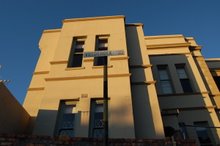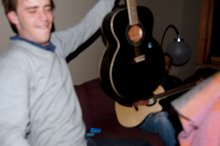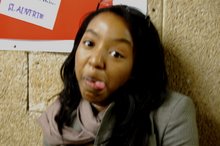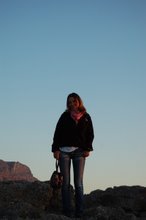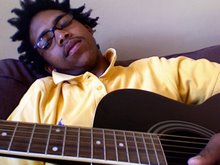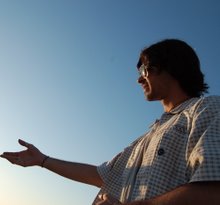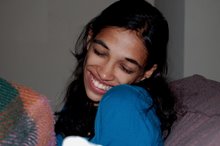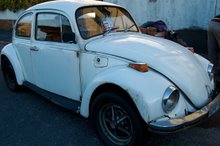Why? Why? Why do they do this?
This is the question I had when I awoke this morning. Notably it was not "Why Democracy?" nor "Why the hell am I thinking about writing this blog post before I am officially awake and in the line of duty, equipped with caffeine running through my veins to make up for less than 5 hours sleep -- again.".
Words and pictures are stuck in my head: Why do these people stand up? Why do they try, why do they fight a hopeless war just to lose? Why are they so irrationally passionate about their subject that they stand up to organise themselves and to protest loudly, to get engaged in a war they are very unlikely to win, because the opposite side is so powerful, seems so all powerful from their perspective, is so E V E R Y W H E R E. Is their backbone stronger than yours?
Why do women with a good life and armed with not much more than a wired office, their cameras, computers and voices create Shayfeen.com and open up to our documentary filmmakers Leila Menjou and Sherief Elkatsha to show what should be hidden? Why do they expose themselves so easily, becoming nothing more than a moving target for a well trained sniper? It would take so little to make their voices die and even today they can be shot down so fast that no one ever would hear them again. Why do they -- happily and willingly, it seems to me -- endanger their families and beloved ones, their friends and co-workers, to fight? Not enough fighting in their own country, they do not exactly work from the underground: Having a camera and a film maker following them on their journey.
Whether the film is about introducing a totally new subject to 9-year-olds in an elementary school environment or whether they try to document their own government officials keeping them from voting: At the end of the shoot, the tapes and recorded material had to be smuggled out of their countries, leaving the contributors, filmmakers and their families behind as a subject of interest for their own government. The focus changes and within days the observer becomes the observed.
Why do peaceful monks in Burma care enough, why do they gather in order to protest, to die? Why are bloggers and citizen journalists who never had an official story before taking their digital cameras, going out there and documenting what happens to the human rights activists -- whatever it takes? Why is it not enough that people already died for what they believed in? How can one side of the argument be so democratic (monks and demonstrators, peacefully united in their protests) while the other side is so willing, so comfortable -- it seems -- with taking fatal actions against their own citizens? Democracy is no one way street, it can't be!
Why does a documentary filmmaker, living a relatively free and happy life in New York City pick up one of the most personal topics -- his own identity -- and works over more than five years to create a movie he knew from the very beginning, would heat up a controversy that is not only linked to him being Muslim and gay, but to a war that started six years ago? Why does he do this -- fraternizing with people he did not know then, people who share maybe not more than sexual orientation and religious beliefs with him? Why is he willing to face all the threats he knew could arise from this work?
I do not know what answers all those questions for all those wonderful and incredibly brave people, full of integrity and belief in their mission, positive about their impact and the outcome of their efforts. Truth is always a matter of perspective. In cultural debates there is no such thing as an objective truth, a real history.
Is it that these people trust in some form of democracy, of participation, that one can actually have an impact that made them come so far? On the news page of a idealistic project, engaging a huge part of the global community in a debate about what democracy means to them? Is it to awaken people in their comfortable living rooms, in front of their big TV screens, to prove that it takes nothing more than a voice, a strong backbone to actually change things? To questioning your own limits and inspire others to do the same? Not taking action because you are one person, insignificant -- this is a common belief -- can only do so much.
Even though us democrats here in the Democracy House in Cape Town are not exactly working at the front line of it, in the masses of India or Bolivia, facing and questioning religious and political leaders in person -- we all grew during this project with our concept of democracy. These days democracy is not as certain as we, coming from more or less democratic countries all over the world, maybe thought it was. We should not forget that today's democratic countries did not evolve peacefully. They also had to fight their wars for it.
But is seems like as soon as you get involved and engaged in a subject so much bigger than you, it makes things less scary: As soon as you reveal a subject that really matters to you and your co-activists, as soon as you find your own loud voice, an alternative perspective arises: Things start to seem possible. Things start to take shape in front of your closed eyes, lying in your bed, after five hours of sleep. Things you are passionate about. It is an enlightening and empowering process at the same time: As soon as Alice confronted the Wonderland with her own voice she was less scared and the nightmare ended -- leaving her within another world, a new environment, a room full of new chances.
And this is how the Democracy Crew basically ended volunteering a summer in Cape Town: It cost us a summer, a couple of tickets, a lot of sleep. But what did we gain in one small wired house in Cape Town! Friends and a new focus on subjects and food and life. A greater understanding of passion and what it really means to be committed, to stick to an idea or story you think it's worth to be told, no matter what.
A couple of years ago people in pretty safe jobs and offices, spread around the world, decided to take a risk. People who could have been a lot less stressed out in the last years if it wasn't for that decision. Brave people who first had not the means but the agenda to empower others, to create a global forum for debate and to make an extraordinary contribution to this world -- and they made it happen.
Why? There is no correct universal answer for all these questions. All the creative protesters, brave documentarists and artists out there have a personal motivation and that is what makes these issues so diverse and so accessible for a global audience at the same time.
Why? For me the answer is simple and I know it for all the things I am really passionate about: Why? Because some things are worth fighting for.
/Amy
Showing posts with label protests. Show all posts
Showing posts with label protests. Show all posts
Tuesday, October 2, 2007
Conversations with Alice - or in Denial?
Posted by Why Democracy House at 10:42 AM 1 comments
Labels: activists , democracy , documentaries , human rights , protests
Subscribe to:
Posts (Atom)
